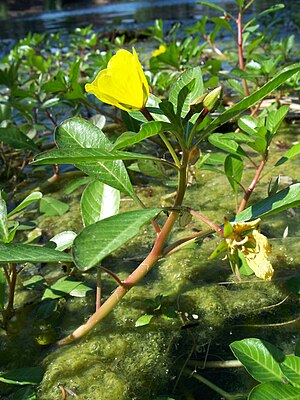Flooding hayweed
| Flooding hayweed | ||||||||||||
|---|---|---|---|---|---|---|---|---|---|---|---|---|

Flooding hayweed ( Ludwigia peploides ) |
||||||||||||
| Systematics | ||||||||||||
|
||||||||||||
| Scientific name | ||||||||||||
| Ludwigia peploides | ||||||||||||
The flood hayweed ( Ludwigia peploides ) is a species of aquatic plant from the genus of the hayweed within the evening primrose family (Onagraceae).
It is a perennial aquatic plant with a weak stem. The flood hayweed grows in bodies of water up to 3 meters deep and can reach up to 80 cm above the surface of the water. The alternately arranged, barely or hairless leaves grow up to 10 cm in size. While the submerged leaves are plump, the leaves above the surface of the water are elongated. It has single hermaphroditic yellow flowers. The elongated capsule fruit is hairless and 2 cm long.
Like the large-flowered hayweed , the species was brought to Europe from southern North America, Mexico , Central and South America as an ornamental plant in horticulture and botanical gardens in the early 19th century. The first occurrence in Europe is documented in France in 1820.
The flood hayweed can form almost impenetrable mats and thus displace the native flora. It can also lead to disruptions in flood protection and drainage systems.
The species is known for its allelopathy , which can lead to ecotoxic effects in the affected ecosystems .
It is included in the list of invasive alien species of Union-wide importance , the warning list of invasive vascular plant species in Germany and the list of alien invasive plants in Switzerland . With the exception of control, any handling of the plant is prohibited.
Individual evidence
- ↑ a b c Species profiles. Retrieved July 17, 2020 .
- ↑ a b Ludwigia peploides - Flooding hayweed. Retrieved July 17, 2020 .
- ↑ Ludwigia peploides. Retrieved July 17, 2020 .
- ↑ Invasive neophytes (forbidden plants). Retrieved July 17, 2020 .
